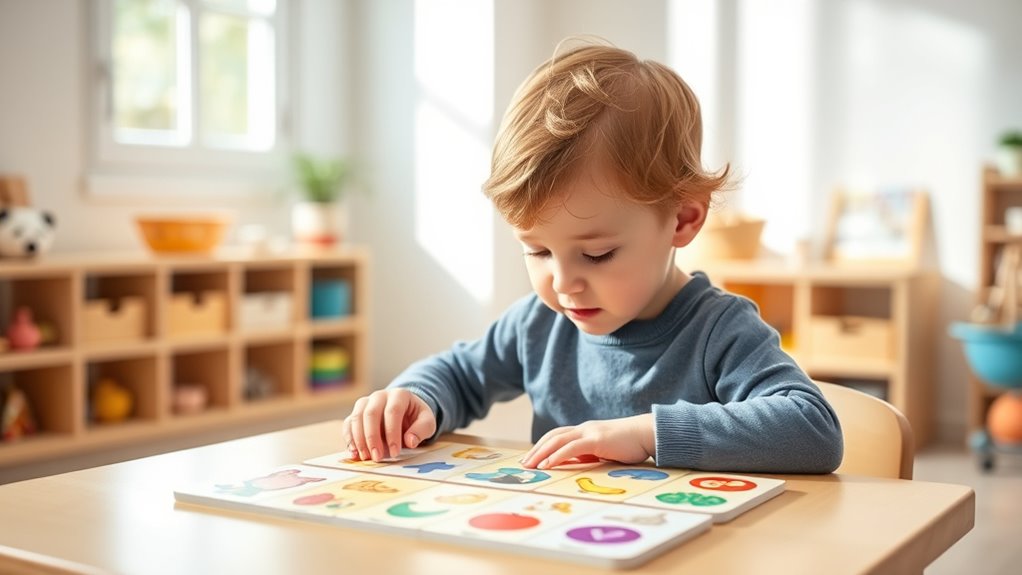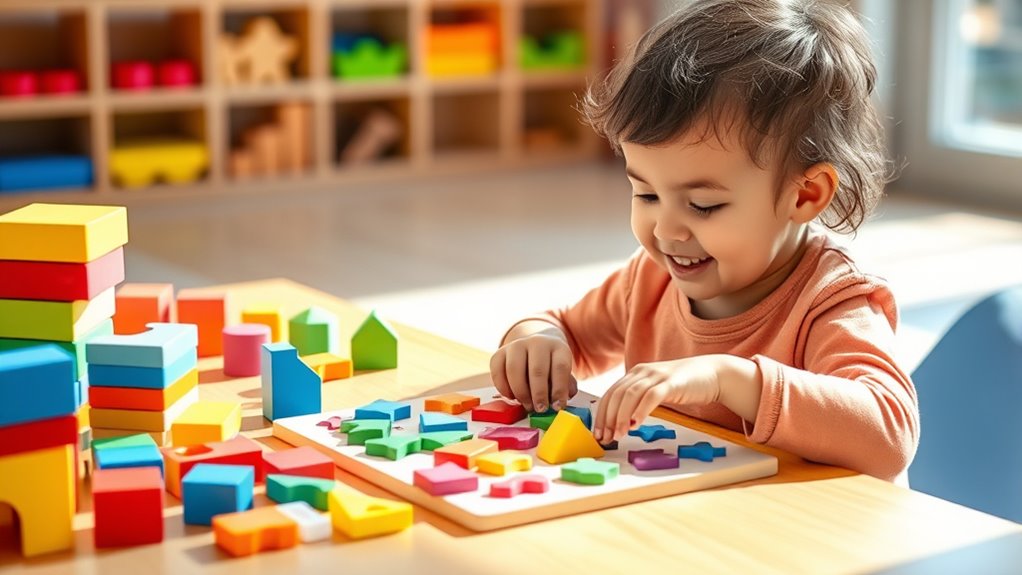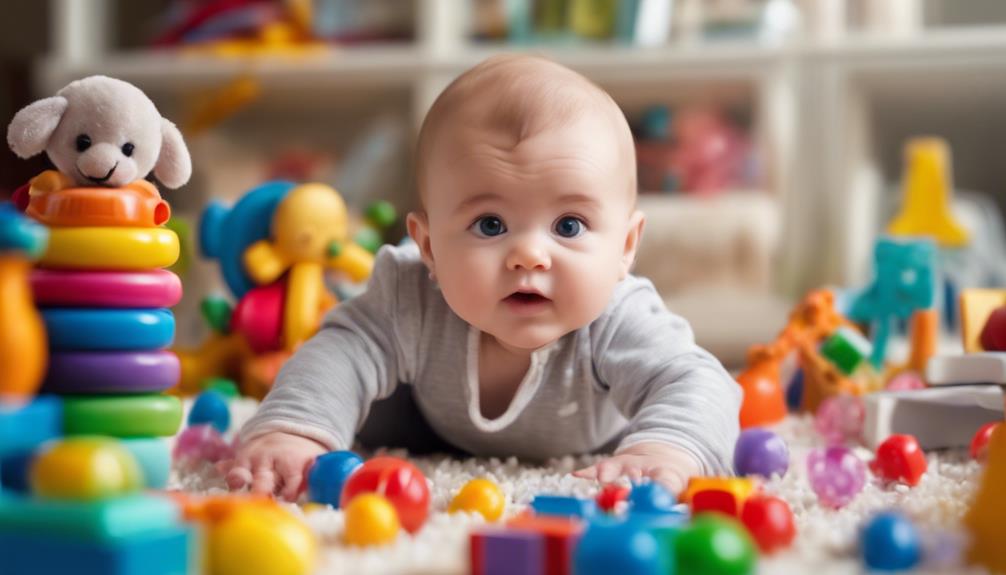To challenge your toddler’s problem-solving skills, try engaging them with simple puzzles that focus on colors and patterns. Play matching games like pairing shapes or colored blocks to boost their memory and attention to detail. Incorporate everyday challenges, such as outdoor activities or decision-making scenarios, to develop independence and critical thinking. These activities foster confidence and curiosity. If you’re interested, you’ll find more ideas to support their growth and learning along the way.
Key Takeaways
- Use colorful puzzles to enhance pattern recognition and visual perception.
- Incorporate matching games with shapes and colors to boost attention to detail.
- Engage toddlers in outdoor challenges like obstacle courses or treasure hunts.
- Promote storytelling activities that require decision-making and critical thinking.
- Introduce simple, age-appropriate problem-solving tasks to build confidence and resilience.
Engaging Puzzles for Young Minds

Engaging puzzles are an excellent way to stimulate young minds and develop their problem-solving skills. When you introduce puzzles that focus on color recognition, your toddler begins to identify and differentiate vibrant hues, strengthening their visual perception. Pattern sorting puzzles encourage children to analyze and organize objects based on similarities, fostering critical thinking. These activities challenge them to think logically and make decisions, laying a foundation for more complex problem-solving tasks later. As they manipulate pieces, they learn to recognize shapes, colors, and patterns, enhancing their cognitive development. Additionally, understanding the role of color accuracy in visual perception can help in designing more engaging and educational puzzle activities. Color recognition is fundamental in early childhood learning and can significantly improve their ability to distinguish and interpret visual information. Developing visual discrimination skills further enhances their capacity to notice subtle differences and similarities, which is essential for many learning tasks. Keeping puzzles simple and colorful to hold their interest is essential, as visual engagement plays a crucial role in early learning. Regularly offering these engaging tasks helps your child build confidence in their abilities while having fun exploring the world of shapes and colors. Incorporating developmentally appropriate activities can further support their overall growth and curiosity.
Matching Games to Boost Cognitive Skills

Have you noticed how matching games can effectively enhance your child’s cognitive skills? These activities promote essential skills like color recognition and shape sorting. By encouraging your toddler to pair similar objects, you help them identify colors and recognize different shapes, which lays the foundation for more complex problem-solving. You can use simple materials like colored blocks or shape cards to make these games engaging. As they match items, they improve their attention to detail and memory. Plus, matching games provide immediate feedback, helping your child learn from their mistakes. Regular practice not only boosts their ability to distinguish colors and shapes but also nurtures their overall logical thinking. Incorporating self watering plant pots into play can introduce children to concepts of care and responsibility in a fun way. Additionally, understanding the importance of local laws and resources can help parents select appropriate activities that align with their child’s developmental stage. Being aware of developmental milestones can further guide parents in choosing suitable problem-solving activities for their toddlers. Engaging in diverse activities that foster early learning skills is essential for their growth. Incorporating activities that stimulate cognitive development can further enhance their problem-solving abilities. These straightforward activities are perfect for strengthening your toddler’s problem-solving skills in a fun, interactive way.
Everyday Challenges to Encourage Independent Thinking

Building on your child’s developing problem-solving skills through matching games, introducing everyday challenges can further foster independent thinking. Encourage your toddler to navigate simple outdoor exploration, such as finding objects or solving minor obstacles. Use storytelling techniques to make these challenges engaging—create scenarios where they need to decide what to do next, like choosing their path during a walk or figuring out how to open a tricky container. These activities push your child to think critically and make decisions on their own. Incorporating developmentally appropriate activities can help ensure consistency in routines and rules across households, which further supports your child’s emotional security. Introducing structured routines that encourage predictability and confidence during these challenges can also help your little one feel more secure and willing to explore new solutions. Engaging in activities with portable camping gear like tents or outdoor tools can also motivate your child to problem-solve in real-world situations. It’s also helpful to incorporate celebrity lifestyle insights, such as observing how public figures adapt to challenges, to inspire resilience and creative thinking. By integrating storytelling and outdoor exploration, you help your little one develop confidence and resilience. Consistently presenting manageable challenges nurtures their curiosity and builds the foundation for stronger problem-solving skills in everyday life.
Frequently Asked Questions
At What Age Should I Start Introducing Problem-Solving Activities?
You should start introducing age-appropriate challenges as early as toddlerhood, around age 1 or 2. Focus on activities that align with developmental milestones, like stacking blocks or simple puzzles. These activities help build problem-solving skills gradually. As your child grows, increase complexity to match their abilities. Engaging in these challenges supports their cognitive development and encourages curiosity, setting a solid foundation for more advanced skills later on.
How Can I Make Puzzles More Engaging for Toddlers?
To make puzzles more engaging for your toddler, you can enhance their experience with interactive puzzles and sensory activities. Use colorful pieces, textured surfaces, and movable parts to captivate their attention, stimulate their senses, and encourage exploration. Incorporate storytelling or challenge them with different puzzle types to keep things fresh and exciting. By making puzzles interactive and sensory-rich, you help your toddler develop problem-solving skills while having fun and staying engaged.
Are There Any Safety Concerns With Specific Toys or Activities?
When considering toy safety, you should always check for small parts, sharp edges, and choking hazards to protect your toddler. Always supervise activities to ensure they play safely and avoid accidents. Look for age-appropriate toys that meet safety standards, and regularly inspect toys for damage. By staying vigilant and practicing activity supervision, you can create a safe environment that encourages your child’s development without unnecessary risks.
How Do I Adapt Activities for Children With Developmental Delays?
Imagine you’re planting a garden, and each child is a unique flower needing special care. To adapt activities for children with developmental delays, you use individualized modifications like adjusting difficulty or providing sensory support. Incorporate inclusive play strategies to guarantee everyone feels valued. This approach allows each child to blossom, making learning engaging and accessible. Your thoughtful adaptations help create a nurturing environment where all children thrive together.
What Signs Indicate My Toddler Is Ready for More Complex Challenges?
You notice your toddler showing increased attention span and reaching cognitive milestones, indicating they’re ready for more complex challenges. Watch for signs like solving simple puzzles, following multi-step directions, or showing curiosity beyond basic activities. These behaviors suggest their problem-solving skills are developing, and you can introduce slightly harder tasks to foster their growth. Keep observing their responses to guarantee the activities remain engaging without overwhelming them.
Conclusion
By incorporating these simple activities into your toddler’s daily routine, you’re planting seeds of curiosity and resilience. Think of their developing mind as a garden—each puzzle and matching game is like water and sunshine nurturing growth. Remember, every challenge they face now builds a stronger, smarter thinker for tomorrow. So, embrace these moments; they’re not just play, but the building blocks of a bright, problem-solving future.










